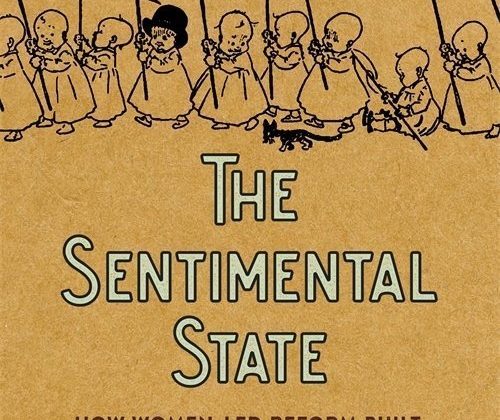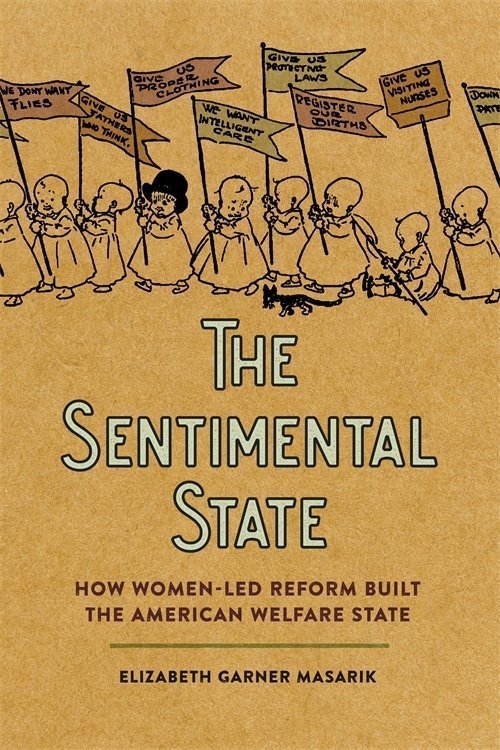

Elizabeth Garner Masarik is Assistant Professor of History at the State University of New York, Brockport. This interview is based on her new book, The Sentimental State: How Women-Led Reform Built the American Welfare State (University of Georgia Press, 2024).
JF: What led you to write The Sentimental State?
EGM: This book came out of my dissertation. I had a strange, roundabout way of getting into grad school and then the PhD Program. I was in my mid-thirties and was basically “starting over.” To make a long story short, I lost my job in the 2008 recession while I was pregnant with my first child. That sent me on a journey into the world of welfare and a new and different reality. I moved to New York and started graduate school after being out of school for over a decade and with (by that point) two young children. During the first semester of my Master’s program, I took a women’s history course with Susan Cahn and was hooked. I became fascinated with the U.S. maternalist movement of the late 19th and early 20th century and dove headfirst into learning about the early formation of the U.S. welfare state. Additionally, the primary sources I found where women were speaking about and grieving over the death of their infants and young children affected me in a personal way. After becoming a mother myself, I just couldn’t fathom being able to go on with life if one of my children died. And so, in a way, examining child and infant mortality became a kind of masochistic way for me to study history while also feeling this immense empathy for my subjects. It was a really weird dynamic. I didn’t set out to focus on infant and child death at the beginning, but the connections between emotions and state-building through the welfare state became so glaringly obvious that I couldn’t look away. It was a subject that spoke to me as a mother and as a recipient of welfare. It felt very personal.
JF: In 2 sentences, what is the argument of The Sentimental State?
EGM: The Sentimental State argues that middle-class women, both white and Black, harnessed the nineteenth-century “culture of sentiment” to generate political action through programs that tapped state and federal funds long before the New Deal. The interwoven social issues of infant mortality and the sexual double-standard drove these women reformers to create programs that formed the early American welfare state in the first decades of the 20th century.
JF: Why do we need to read The Sentimental State?
EGM: What I really wanted to do in this book is show how the American welfare state is built on the backs of women’s labor – that women in the late 19th and early 20th centuries saw a need for reform and cobbled together networks that addressed these issues. So, at its core, this is a book of women’s history, but it’s also a book about state building and politics, particularly political activism in an age before American women had the right to vote. The book shows how these women exerted control, exerted agency, built political coalitions, and built networks that really got a lot done in an age where they had no official political voice, i.e.., in an age before the 19th Amendment.
On its surface, infant mortality and sex work might seem to be two completely different moral dilemmas, but they were actually intimately combined. That’s where the sentimentalism comes into play. I was working within an existing historiography that tracks the growth of the welfare state before the New Deal. Some important work that influenced me are Robyn Muncy’s Creating a Female Dominion in American Reform, Maureen Fitzgerald’s Habits of Compassion, a lot of Linda Gordon’s earlier work, Michelle Mitchell’s Righteous Propagation, Theda Skocpol’s Protecting Soldiers and Mothers, Brian Balogh’s A Government Out of Sight... These are some historians and books that really stick out to me as being foundational for how I thought about this project. There was a really great historical discussion going on in the 1990s that was looking at women’s political organizing and the welfare state before the vote. And this was a conversation that I felt needed a revival and I wanted to dive back into this rich historiography and add to it. I wanted to know what makes people step out of their comfort zone and into reform work and I found sentimentalism to be a compelling factor in motivating women to organize on behalf of other women and children outside of their family unit.
JF: Why and when did you become an American historian?
EGM: I kind of addressed this in question 1. However, what made me decide to go back to grad school for history was I moved across the country from Austin, TX (my hometown) to Buffalo, NY. I was, and am, absolutely mesmerized by Buffalo because it’s a Gilded Age city with much of its original architecture still intact. I had a blast learning about the Erie Canal and how industries like grain and steel created such a wealthy city, which all began to crumble in the second half of the twentieth century. It reawakened a desire to study history, and I figured I was already broke, so why not take out some student loans and do something I love? Perhaps a move no financial advisor would suggest but it worked out for me. And now I get paid to be an absolute nerd and teach and research and write on American history. How cool is that?!?
JF: What is your next project?
EGM: I have a second co-written book coming out in October with my co-producers of Dig: A History Podcast. That book is entitled Spiritualism’s Place: Reformers, Seekers, and Séances in Lily Dale and explores the Spiritualist utopian community of Lily Dale in western New York. My next project piggybacks on Spiritualism’s Place and examines women who were Spiritualists and suffragists between 1890 and 1920. I am the inaugural recipient of the SUNY Dr. Virginia Radley Fellowship, which I used this year to travel across the country to archives such as Berkley, the Huntington Library, the Library of Congress, Cornell, and Cassadaga Spiritualist Camp in Florida, researching this new project.
JF: Thanks, Elizabeth!